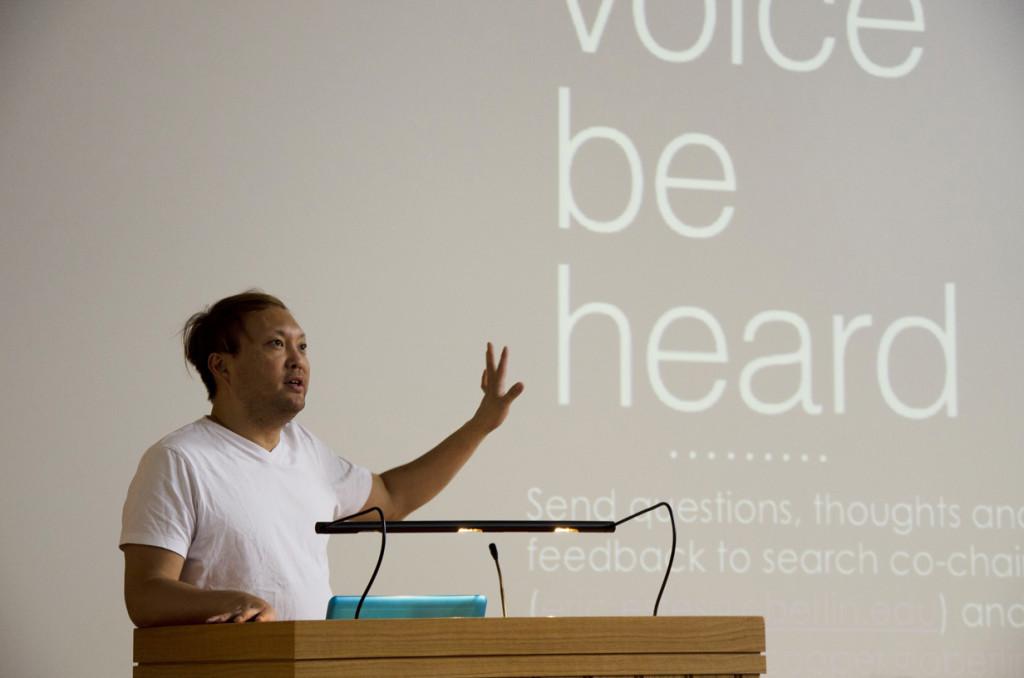New Initiatives for Campus-Wide Safer Policy Enacted
Vice President and Dean of Students Eric Estes addresses attendees of the forum held by the Sexual Offense Task Force as they gather to discuss the reform of the College’s sexual offense policy. The policy, which was adopted in 1993, has since undergone many changes.
November 15, 2013
First adopted in 1993, the sexual offense policy has appeared in multiple incarnations, but the most recent changes were enacted in May 2012. The policy defines various types of sexual misconduct and asserts procedural guidelines in the event of an infraction. College President Marvin Krislov wrote an article last October remarking that the initiatives of other institutions such as Yale University and Amherst College are an opportunity for the College to transform its own means of prevention and procedure.
“We want to break the culture of silence and make people aware of their resources,” said Associate Professor of Comparative American Studies and Associate Dean of Faculty Development Meredith Raimondo. “Our goal around reporting is support and safety.”
On Thursday, Nov. 7, students and faculty gathered in Nancy Schrom Dye Lecture Hall to discuss initiatives to reform the College’s sexual offense policy further. The forum was hosted by the Sexual Offense Task Force, a team of seven assembled by Krislov in the fall of last year, and was moderated by two members of the school’s dialogue center.
The task force is comprised of students, staff and faculty representatives, including Raimondo and Vice President and Dean of Students Eric Estes. Members are responsible for gathering input and information from students and members of the College community. One of the primary operations of the task force is to promote education and communication about policies across campus.
This month, the task force will ask for the input of major committees on campus including the Administrative and Professional Staff Council, the General Faculty Council and Student Senate. Involvement in the reform will also come from student groups that work on sexualized violence such as the Sexual Information Center and OSCA’s Sexual Offense Policy Advocates, in addition to groups of interested individuals and focus groups. As early as spring 2014, the reformed policy will be sent to the General Faculty Council for approval.
Members of the task force explained that after the implementation of the policy’s reform, the next steps will be education and sexualized offense prevention. The committee has discussed the incorporation of the policy and awareness of the consequences of sexual misconduct for survivors and perpetrators to be integrated in the curriculum.
Since the creation of the task force, those involved have adopted various initiatives, including the installment of an online resource guide. This guide comes in response to a call for more comprehensive and accessible support from the institution. It seeks to clarify the importance of reporting sexual misconduct, make the institution’s resources more available to victims and other parties involved, outline the procedure of reported sexual offense violations and educate the campus about prevention and supporting offense survivors.
“The initiative is working to better accommodate victims in all steps of the reporting process,” said College junior and SIC staffer Sophie Meade.
“Students have been centrally involved in the process of reviewing and revising the sexual offense policy. The student task force members have full voice in all task force decisions,” remarked Raimondo.
“Students have also been included in the policy review through consultation with student leaders in the area of sexual offense policy (particularly the OSCA Sexual Offense Policy Advocates and student members of the Sexual Offense Policy Review Committee), through feedback at all-campus forums and in individual meetings with task force members.”
“We want to offer opportunities for input on the draft so that it addresses the concerns of the community as well as our legal and ethical obligations to create a campus free of sexual and gender-based discrimination and violence as fully as possible,” said the task force, who commented as a group.
“These changes reflect the ongoing intention of the College to create an equitable and inclusive campus and work place.”
The task force has also worked to expand the College’s definition of consent by further considering factors of alcohol and drug use that will be featured in the new online resource guide.
“The College has long debated the subject of alcohol and drug use in relation to the sexual offense policy,” Meade said.
“Every reported sexual offense violation in the last two years has involved intoxication. Currently the College deems sexual relations while intoxicated not consensual and they are working to reopen that discussion; intoxicated sexual experiences are prevalent and not always lacking consent.”
Another endeavor undertaken by the task force is the redrafting of the sexual offense policy that is currently in place. Revisions of the policy include rephrasing the policy’s clauses with more accessible language, shortening the length of the report process by including investigative steps in the timeline and addressing mechanisms that address misconduct during Winter Term, summer recess and other breaks that cause delay in the process.
Perhaps the biggest undertaking of the committee is staff turnover and the search for a Director of the Office of Equity Concerns. This newly created position would involve the training and education of students and peer supporters of those involved in sexual misconduct, communication with the campus community, policy development, reform and implementation and the responsibility of being a Title IX coordinator.

























